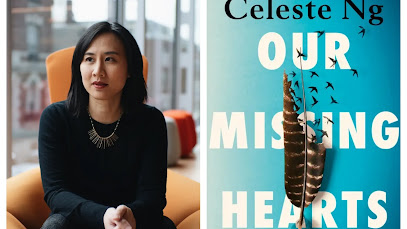Dystopia that's upsettingly believable. ''Our Missing Hearts'' by Celeste Ng.
The definition of ''dystopia'' in the Oxford English dictionary is bald and to the point : An imaginary place in which everything is as bad as possible.''
Literature is full of examples. In ''The Time Machine,'' the Morlocks feed and clothe the Eloi, then eat them. '' The Handmaid's Tale '' deals with state-sanctioned rape. The firefighters in ''Fahrenheit 451'' incinerate books instead of saving them.
In ''1984'' 's infamous Room 101, Winston Smith is finally broken when a cage filled with rats is dumped over his head. In ''Our Missing Hearts,'' Celeste Ng's dystopian America is milder, which makes it more believable - and hence, more upsetting.
Noah Gardner, known as Bird, is a 12-year-old Chinese American living with his father in Cambridge, Mass. His mother is a fugitive, on the run because she wrote a supposedly subversive poem titled ''All our Missing Hearts.''
America is living under PACT - the Preserving American Culture and Traditions Act - which became law during a confused and economically disastrous period known as the Crisis. [ We're given more details about this crisis than we actually need.]
Before the Crisis, Bird's father was a linguist. Now he works in a library, shelving books. In Ng's version of the American Nightmare, there's no need to burn books. '' We pulp them,'' a helpful librarian tells Bird. [Bird doesn't tell her he's picturing book bonfires, but she intuit's it.]
Much more civilized, right? Lash them up, recycle them into toilet paper. Those books wiped someone's rear end a long time ago.''
Less gaudy than firefighters burning books, but more believable. The empty shelves Bird sees in his father's library speaks volumes.
Under PACT, the children of parents considered culturally or politically subversive are ''re-placed'' in foster families. When Bird is given a clue to his mother's whereabouts he goes in search of her, and much of Ng's firmly written and well-executed novel deals with the adventures along the way.
In that sense, the book is a classic tale of the hero's journey, said hero young enough to make the trip from innocence to experience with surprisingly little bitterness directed toward the parent who had abandoned him.
That his mother, Margaret Miu, had no choice would make no difference to most children, it seems to me; abandoned is abandoned.
We have heard this tale of government scapegoating before, which adds to its power rather than detracting from it.
Hitler blamed the Jews for Germany's economic malaise. Trump told us to fear migrant caravans full of ''bad hombres.''
Here it's Asian people in general and Chinese Americans in particular who are held responsible for everything that's gone wrong - blame those who don't look like White America. In New York's Chinatown, street names have been censored : ''Someone - everyone has tried to make the Chinese disappear'' Flag pins decorate every lapel.
Because Ng's storytelling is so calm - serene, almost - the occasional explosions of violence and authentically horrifying, as when Bird observes a man punch a Chinese woman, knock her to the ground, then kick her repeatedly.
There is no reason except for her otherness ........ and perhaps the fact that she looks well off. He then kills her little dog, breaking its back '' the way he might crush a soda can, or a cockroach.''
I won't give away the splendid conclusion of Ng's book; suffice it to say, the climax deals with the power of the words, the power of stories and the persistence of memory. It's impossible not to be moved by Margaret Mio's courage, or to applaud her craftiness.
Is her final word to the world a kind of propaganda? Yes, but sometimes you have to fight fire with fire.
There are peculiar lapses that must be noted. Covid-19 doesn't exist in '' Our Missing Hearts, '' although there can be no doubt that the pandemic has given rise to dark conspiracies having to do with China, where Covid first appeared.
Donald Trump and others were happy to call it the China Flu. Ng likewise ignores social media - there's a single glancing mention near the end of the book - although few innovations in human history have done more to focus and amplify racist tropes.
In fact, social media encourages large numbers of people to deliberately turn away from the truth.
Ng succeeds in spite of these occasional blind spots, partly because her outrage is contained and focused, and mostly because she is often captivated by the very words she is using. Bird's father's oldest habit, we're told, is ''taking words apart like the old clocks to show the gears still ticking inside.''
The gears in this story for the most part mesh very well. And Birds is a brave and believable character, who gives us a relatable portal into a world that seems more like our own every day.
The World Students Society thanks review author Stephen King whose latest novel is ''Fairy Tale.''

.png)


0 comments:
Post a Comment
Grace A Comment!